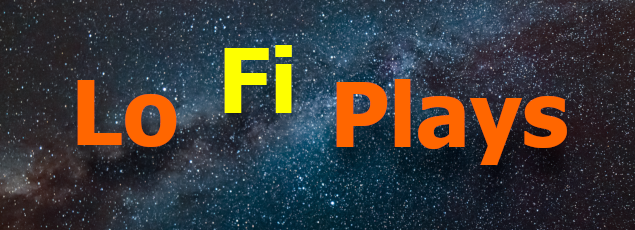
Lo-Fi Plays is a series of blogs that aims to highlight the smaller, minimal-budget titles that often fall under the radar. It's me finding the positives in the most obscure class of indies out there. Keeping with the theme of my lastcouple of articles, the picks for this week will be games about physics and space exploration. Enjoy.
Gravity Trails
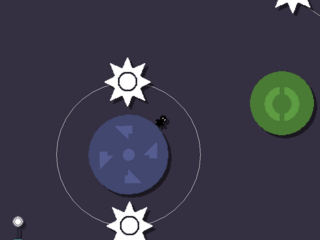
Gravity Trails is a 2D platformer that has you hopping from one planet to another, their gravitational pull holding you in place. You might recognise this mechanic for its brief appearance in Super Mario Odyssey. The movement in these games rewires your brain because where you might expect the controls to translate your character relative to your screen or real-world body, here they move your avatar relative to their position. So, pressing the left arrow might slide your character left in some contexts, but in others, it could move them right or even up or down.
As bizarre as the circular magnetism of Gravity Trails feels, this is how planets work. If someone on the opposite side of Earth from you drops a book right now, relative to you, it will fall upwards. We just never notice because we don't see the other side of the planet, except in a platformer like this. Gravity Trails has the one-hit kills, spike strips, and flat pixel art of VVVVVV. However, regular checkpoints on these rocks keep you motivated because the next victory is only a skip and a jump away. If you were driven away from VVVVVV by its high player expectations, Gravity Trails might be a welcome alternative.
AFTER SUN
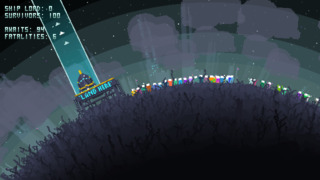
Like Gravity Trails, AFTER SUN employs physics that stick you to the surface of a curving planet, but they're not the main focus. The point of AFTER SUN is to load the doomed meeples of a dying world into your spaceship and rocket them to refuge. It's more of a physics toy than a complete game. Yet, with a technically minimalist depiction of space and the floaty thrust of its vehicle, it's reminiscent of spacefaring arcade treats like Asteroids.
However, the bigger draw of AFTER SUN is its visual and sound design. A booster sound like the one blaring out of this game's rocket occupies a much chunkier range of the sonic spectrum than retro audio hardware could support. The outcome is a wonderfully harsh "whoosh" every time you propel yourself forwards. The environments also show how layering foregrounds and backgrounds can fill a space out, and the monochrome thruster animation on the rocket looks like a blade of fire cutting the screen in two.
UNDER A STAR CALLED SUN
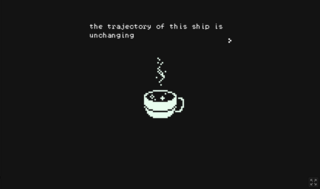
In this interactive poem, space is a metaphor for the idea the developer really wants to talk about: grief. Being stuck on a space station symbolises the loneliness that we feel after a death. Being stuck on a space station symbolises a gap between you and a love that's impossible to bridge. If you've experienced a death and all you have is the dull routine of subsistence, you might feel like you're doing your daily rounds hundreds of miles above the Earth's surface.
The isolation is there, too, in the graphical style. We often describe pixel art as a single look, but there's a lot of range within the medium. UNDER A STAR CALLED SUN looks like an Atari 2600 release if the pixels were equilateral instead of all stretched out. This minimalism creates the impression of a world that's so much less now that the person you care about is gone. Meanwhile, you've got this wistful, blippy soundtrack that reminds of me FTL. The game aches with an authentic representation of loss. A work like this is not just made with assets and code; it's made with pain.
UNDER A STAR CALLED SUN on itch.io
ROCKETPULT
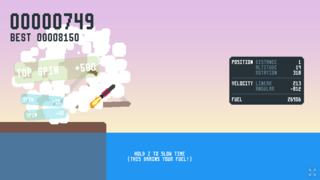
ROCKETPULT is the rare rocketry game that doesn't take place in space. It's far too silly for that. Each run of ROCKETPULT starts with a rotating mechanical arm holding a rocket, and your three potential actions are to fire the rocket's thruster, slow down time, and release the robot hand's grip. Your projectile will fly through the air, colliding with targets, dislodging bonuses and scores that could be text messages from the spirit of physics itself. ROCKETPULT is moreish like an endless runner and so chocked full of explosions and absurdity that even a false start can be fun.
The constant spray of bonuses might jog memories of Ridiculous Fishing. Yet, there's another type of game Rocketpult reminds me of. With its cool, crunchy synth soundtrack, and bombastic, one-shot play, this is the exact type of timewaster I would have played with on Newgrounds when I was a teenager. The internet is lousy with games that are nostalgic for the 8-bit era, but I think Flash deserves its turn in the spotlight too.
SHRUBNAUT
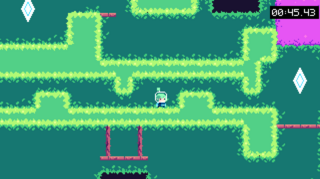
SHRUBNAUT's setting has a strong sense of identity. With a saturated palette of greens, blues, and purples, it paints an extraterrestrial hedge maze for to you solve. You explore that maze as an adorable astronaut, collecting crystals that open up new areas. The quite literal hook of the game is a grapple. Games introducing equipment to free up your movement usually have to counteract that sizeable advantage. In SHRUBNAUT, the catch is that you can only fire the grapple at 90-degree angles. Some surfaces, it rebounds off of entirely.
With its spooky but charming chiptune, its vivid pixel art graphics, and lots of items that don't offer new abilities, SHRUBNAUT would be right at home alongside the brilliant Celeste. And as in Celeste, pressing the right controls in the right order at speed is a non-trivial challenge. SHRUBNAUT also has a small but wonderful design detail I'd appreciate seeing in more puzzle games: it lets you use the grapple to pull cubes towards you. No more wasting time walking about the level to pick up a weight for a pressure plate.
Quantum Splitter
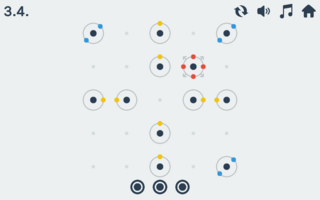
Atoms are particles composed of smaller particles, and when you split one, its constituent parts can fly into other atoms, causing them to shatter. It's possible to create a sustained chain reaction of these divisions, which is the principle a fission reactor runs on. It's also roughly the phenomenon on display in Quantum Splitter. In its puzzles, we can click one atom and watch its particles fly off in the direction they're facing, and we want to use the knock-on effects of that release to crack all its atoms in one click.
This is mostly an "order of operations" challenge, where you're thinking "If I do W, X will happen, which will cause Y to happen, which will cause Z to happen", and so on. In this sense, the game captures both the essence of chain reactions and building complex machines. Programmers eat your heart out. To get the most out of Quantum Splitter, I'd advise solving early levels in your head instead of brute forcing them, but the stages do become confounding before too long. It's impressive that a game this tiny manages to introduce a new mechanic with each world. Chapter 2 lets us reposition the atoms, Chapter 3 has us make multiple reactions in one level, etc.
___
That's another edition of Lo-Fi Plays. I hope you found something here that looks tempting, and once again, thanks for reading.
Log in to comment